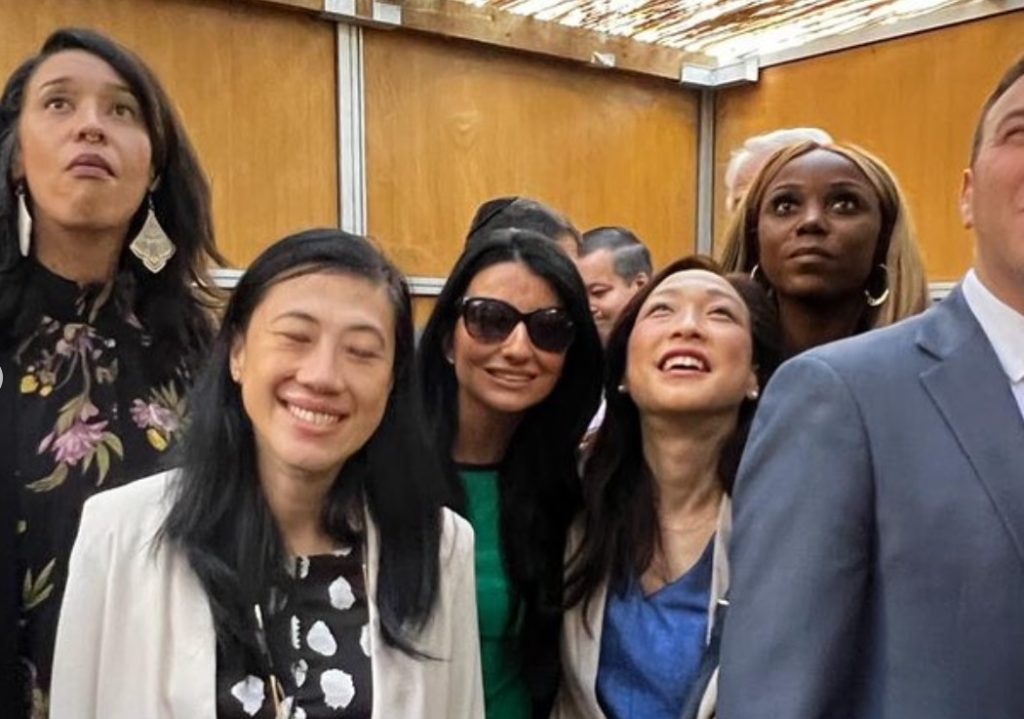On Tuesday, October 22, 2024, a special Sukkah Celebration took place at the City Hall Sukkah, located at the Broadway and Murray Street entrance. Held from 10:30 AM to 12:00 PM, the event brought together New Yorkers and city officials to celebrate and honor the Jewish holiday of Sukkot. The sukkah was proudly made possible by the Chabad Lubavitch Youth Organization.
During the celebration, NYC Council Speaker Adrienne E. Adams, alongside Jewish Caucus members and community leaders, hosted a breakfast reception to mark the occasion. Adams shared, “Sukkot offers us the opportunity to meet with friends and neighbors to honor our past and reflect on the blessings in our lives. To all New Yorkers celebrating, Chag Sukkot Sameach!”

Since 2019, the City Hall Sukkah has been a cherished tradition, symbolizing New York City’s commitment to inclusivity and respect for diverse religious practices. Serving as a welcoming space for the Jewish community, the sukkah provides an opportunity to partake in the mitzvah of eating and gathering under the sukkah during the intermediate days of Sukkot, or Chol Hamoed. This year, the 18×12-foot sukkah was prominently positioned at the entrance to City Hall, serving as a vibrant centerpiece for the holiday and inviting visitors to experience the joy and unity of Sukkot firsthand.
Beautifully adorned with traditional decorations, the sukkah reflected the festive spirit of the season, fostering a sense of connection and belonging among attendees. Beyond its practical purpose, the sukkah stood as a testament to the city’s celebration of cultural and religious diversity, welcoming individuals from all walks of life to engage in this time-honored tradition. The continued presence of the sukkah at City Hall underscores its role not only as a sacred space but also as a symbol of community solidarity, bridging the gap between civic leadership and the vibrant Jewish community it serves.
The Significance of the Sukkah:
Those huts are called Sukkot, and during the Jewish holiday of Sukkot, it is traditional to eat and, for some, sleep in a sukkah for seven days. Sukkot is one of the three major festivals in Judaism and is both an agricultural festival of thanksgiving and a commemoration of the forty-year period during which the children of Israel wandered in the desert after leaving slavery in Egypt, living in temporary shelters as they traveled. Sukkot is known as “the Time of our Happiness.”

On Sukkot, we are asked to leave the material comfort of our homes and build a structure that is imperfect, temporary, and open to the elements. The sukkah’s reminder that our existence is fragile helps us to treasure the joyous moments of life, and its outdoor location encourages us to focus on the beauty of the world around us. Indeed, the sukkah has no permanent roof but is instead covered with schach (greenery or bamboo), so that we can see the stars when we look up at night. The sukkah is also a gathering place, where it is traditional to welcome guests and enjoy spending time together.
Among the notable attendees at the Sukkot breakfast were Council Speaker Adrienne E. Adams, Jewish Caucus Chair Council Member Eric Dinowitz, and Council Members Lynn Schulman, Julie Menin, Ari Kagan, Lincoln Restler, Inna Vernikov, and Kalman Yeger. Each of these leaders extended their heartfelt wishes for a joyous and meaningful Sukkot, emphasizing the holiday’s significance in fostering unity, gratitude, and community spirit.

During the breakfast, Council Member Lynn Schulman passionately addressed the gathering, highlighting the importance of the event in supporting Jewish traditions and values. “We are proud to help people fulfill their obligation,” she stated with enthusiasm, referencing the mitzvot of Sukkot, such as dwelling in the sukkah and shaking the lulav and etrog. Schulman further commended the collective efforts to preserve and celebrate Jewish heritage, underscoring the City Council’s commitment to uplifting all communities during their sacred observances.
The event served not only as a celebration of the holiday but also as a platform for meaningful dialogue among community leaders and attendees, strengthening bonds across diverse neighborhoods in New York City.
Meyer Harroch, New York Jewish Travel Guide (October 23, 2024)



You must be logged in to post a comment Login